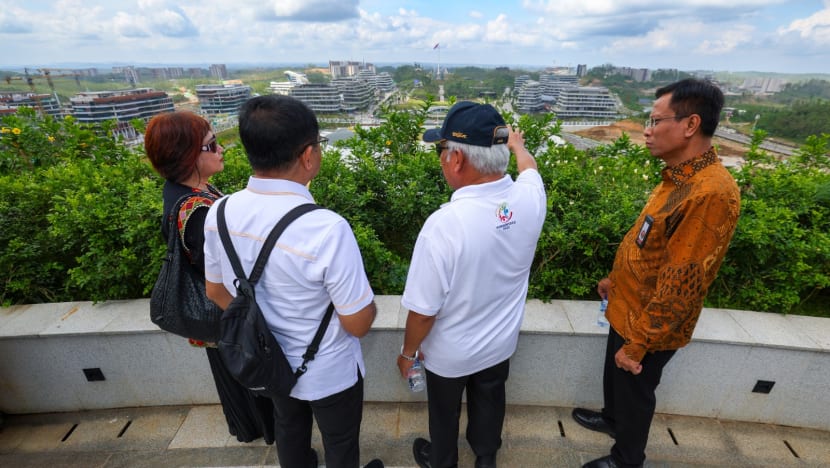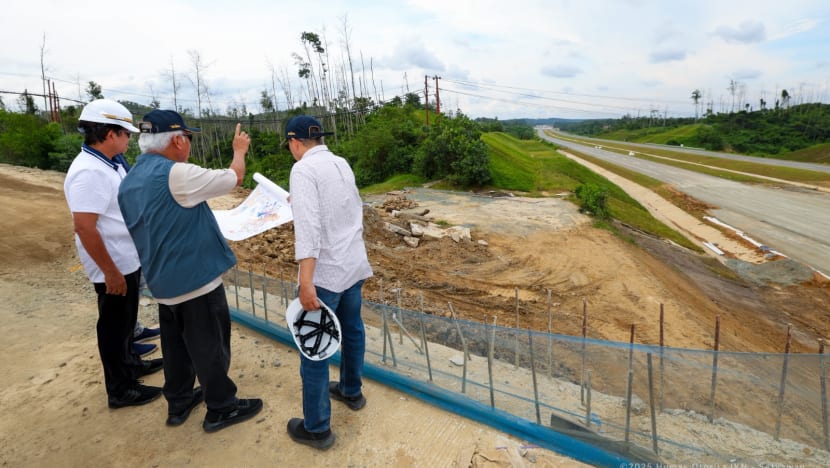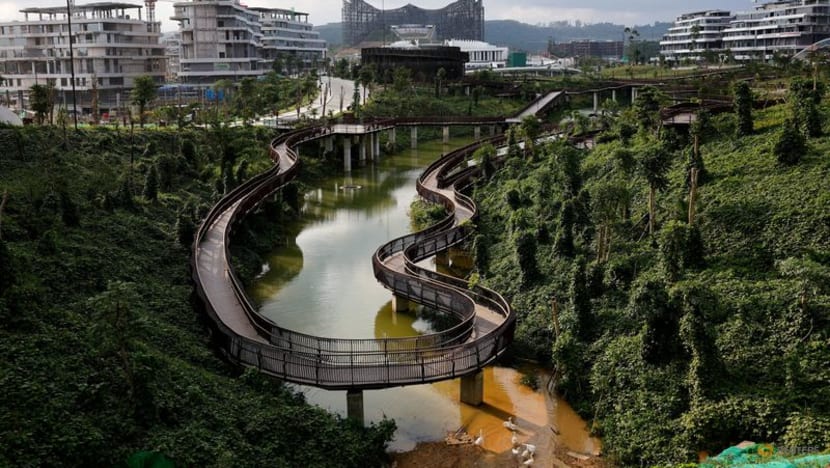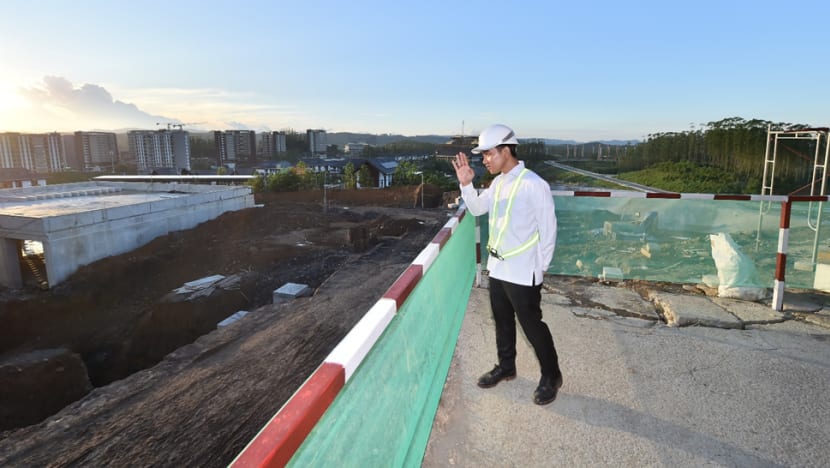analysis Asia
New Indonesia capital or ghost town? President Prabowo's lack of urgency towards Nusantara fuels debate, fears
President Prabowo Subianto’s decision not to host Indonesia’s Aug 17 Independence Day celebrations in Nusantara has put the planned capital’s future in doubt, observers say.

Nusantara Capital Authority chief Basuki Hadimuljono (second from right) shows politicians the progress of Indonesia's planned capital, Nusantara, on Jul 26, 2025. (Photo: Nusantara Capital Authority)

This audio is generated by an AI tool.
JAKARTA: Ahead of Indonesia’s Aug 17 Independence Day last year, Nusantara was abuzz with activity as construction crews worked round the clock to make sure the future capital was presentable to the throng of senior government officials, foreign dignitaries and journalists in attendance.
Despite various hiccups stemming from the lack of accommodation and basic public infrastructure, Nusantara hosted its first Independence Day ceremony.
Many Indonesians assumed that future celebrations would be held there.
This Sunday (Aug 17), however, the ceremony to mark Indonesia’s 80th year of independence will return to familiar territory: Jakarta’s Merdeka Palace.
President Prabowo Subianto’s decision not to host celebrations in Nusantara, coupled with other moves that observers say signal a muted interest in the capital relocation, has raised doubts about the East Kalimantan city’s future in the minds of observers and various political parties.
Placing Nusantara on the back burner could spell backlash for Prabowo ahead of the 2029 presidential election by creating a rift with his predecessor Joko “Jokowi” Widodo, observers said.
It could also hurt investor confidence in the project, observers said.
Taking into account Indonesia’s recent deployment of a modern short-range ballistic missile system in East Kalimantan that would help safeguard Nusantara from a range of threat scenarios, experts told CNA that only time will tell if the capital relocation takes place as planned.
CONTROVERSIAL TO BEGIN WITH
In 2019, Jokowi mooted the idea to move Indonesia’s administrative centre, arguing that Jakarta’s crippling traffic congestion, regular flooding, polluted air and sinking land surface made it no longer fit to be the nation’s capital.
A new city needed to be built somewhere in Kalimantan, the Indonesian portion of Borneo, that was free of natural disasters and geographically positioned near the literal centre of the country, he said.
Jokowi also hoped relocating the capital would correct the deep economic imbalance between the archipelago’s well-developed western provinces and its long-neglected eastern frontiers.
But the project struggled to win the hearts and minds of many Indonesians and criticism poured in from multiple fronts even before the project broke ground in 2022.
Environmentalists warned of irreparable damage to Kalimantan’s delicate rainforest ecosystem. Indigenous communities worried that they might be displaced or have their traditional way of life impacted. Experts questioned the viability of pumping tens of billions of dollars into a project that might not yield the promised returns.
Tellingly, the very people meant to bring the new capital to life, Jakarta’s civil servants, were reluctant to relocate. A survey in 2019 showed that 94 per cent of public workers said that they would rather resign or apply for early retirement than move to the new city.
Indonesia passed a law in 2022 which serves as a basis for the construction of a new capital as well as a guideline on how the new capital should be managed and designed.
The law, however, stipulates that when the move will commence is to be detailed further in a presidential decree, which hasn’t been signed by the president, despite expectations that it would be done shortly after Prabowo was sworn into office last October.
“Prabowo realised that the project is quite controversial and public support for the project is not all that great,” Siti Zuhro, a political expert at the Indonesian Research and Innovation Agency (BRIN), told CNA.
This means there is little public pressure for the president to move the capital any time soon. Meanwhile, Prabowo has other things in mind.
“Prabowo’s vision is to build economic resilience from the ground up. That’s why he has programmes like establishing village cooperatives and poverty alleviation initiatives like the free meal programme,” Siti said.
Prabowo’s plan to develop 80,000 cooperatives in almost every rural area across Indonesia comes with a US$25 billion price tag while the free meal initiative is expected to cost Indonesian taxpayers US$7 billion annually.
Prabowo’s other programmes include free health checks, free boarding schools for low-income families and building one million affordable homes annually.
His approach is very different from that of Jokowi, who believed that economic development could be achieved through megaprojects, Siti said.
“The current government clearly wants to prioritise its own programmes ... which also require a massive amount of funds at the expense of legacy programmes from the previous administration,” said Adi Prayitno, a political expert from Jakarta’s Syarif Hidayatullah State Islamic University.
IMPACT ON INVESTORS
The hefty price tags of these programmes meant there was less for the Nusantara project.
While Jokowi poured 89 trillion rupiah (US$5.5 billion) into Nusantara’s development between 2022 and 2024, Prabowo has pledged only 48.8 trillion rupiah between 2025 and 2029.
Government funding for the megaproject was put on hold between January and April this year as Prabowo introduced a series of austerity measures to free up billions of dollars needed for his flagship programmes and policies.
Senior officials close to Prabowo had to reaffirm in recent weeks the government’s commitment to relocate the capital by around 2029, after the National Democratic Party (NasDem) urged it to clarify its policy direction.
NasDem, one of only two political parties outside of Prabowo’s big-tent coalition, had called on the president to either speed up the issuance of the relocation decree, or suspend the project entirely.
Meanwhile, a coalition member, the National Awakening Party, called for the project not to be “left idle for too long”, while the Democratic Party – also part of the coalition – said development could be accelerated by having some ministries begin to operate there.
During a parliamentary hearing on Jul 30, Basuki Hadimuljono, head of the Nusantara Capital Authority, said his office has completed “phase one” of Nusantara construction and will soon be moving to “phase two”.
Phase one of the project includes building a presidential palace, offices for 15 ministries and 47 apartment towers for thousands of civil servants. It also includes basic infrastructure like fresh water supply, a sanitation system and electricity supply.

Basuki said for the second phase, his office will start working on offices for the parliamentary and judiciary branches of the government along with 97 apartment towers and a solar farm. This phase is expected to be completed in 2029.
In total, there are five phases planned stretching all the way to 2045, Indonesia’s 100th year celebration.
State Secretary Minister Prasetyo Hadi said on Aug 4 that Prabowo is still committed to “building Nusantara as fast as possible” after he announced this year’s Independence Day celebration would be in Jakarta.
Prabowo, he said, is waiting for the completion of buildings for all branches of the government before signing a decree formalising the capital’s move.
“Based on our estimate, over the next three years all the facilities needed to run the functions of a government, be they executive, legislative and judiciary, will be completed. These are the facilities which we feel must be available before the president signs a decree on moving the capital,” the minister said.
But the lack of investors remains an obstacle, observers said.
The government wanted private investors to foot most of the US$35 billion cost to build Nusantara from the ground up.
But as of April, only 42 companies, mostly Indonesia-based, agreed to put money in Nusantara and build schools, hospitals and other facilities worth a total of US$3.8 billion.
There are investors who have pledged to contribute to the project but have not signed any formal agreement, let alone begin construction.
Among them is Prabowo’s brother Hashim Djojohadikusumo, who promised to build a US$330 million water treatment and distribution network.
Hashim made the pledge in 2022 but there is no sign yet that the project is moving forward.
On Aug 2, Hashim announced that his company, Arsari Group, would be supplying water to the nearby city of Balikpapan instead but told reporters he is still ready to extend his water network to Nusantara if needed.
“Investors would want a guarantee that the capital move will indeed happen. That (guarantee) can come in the form of a decree formalising the capital move or the government putting in more money to show just how serious they are,” said Djayadi Hanan, executive director of think-tank Indonesian Survey Institute (LSI). “But none of this is happening right now.”

Any significant change in plans for Nusantara will hurt investor confidence, he said.
“Investors will be more careful about putting money in Indonesia because backing away from a project of this magnitude sends a message that Indonesia is not a place where policies are consistent and commitments are honoured,” Djayadi said.
A positive signal, military experts recently told CNA, is Indonesia’s deployment of the recently-purchased KHAN short-range ballistic missile system in East Kalimantan, near the future capital.
Although Indonesia has not confirmed the deployment is related to the capital move, military experts said the location would make it ideal for defending one of Indonesia’s most important shipping routes and the future seat of government from a range of threat scenarios including potential long-range precision missile strikes.
NEW CAPITAL OR “GHOST TOWN”?
Delaying the relocation to Nusantara will have political implications for Prabowo in terms of his relationship with Jokowi and his proximity to Indonesia’s political elites, experts said.
Unless all of the parties in his coalition agree to move their headquarters from Jakarta to the new capital, moving to Nusantara would keep Prabowo away from the de facto political centre of Indonesia, they noted.
Prabowo cannot afford to stay too far from his circle of political elites if he wants to run for re-election in 2029, but delaying the move would mean displeasing his political patron Jokowi, who still has legions of loyal supporters, they said.
“Prabowo rose to power because of Jokowi’s support, which led many of Jokowi’s fans to vote for Prabowo. If Prabowo can show that he can be as popular as Jokowi through his populist programmes, he might go against Jokowi’s wishes and not move the capital,” Hendri Satrio, a political expert from Jakarta’s Paramadina University, told CNA.
“Prabowo has also appointed Jokowi’s loyalists to strategic positions. So I think Prabowo’s popularity in the eyes of Jokowi supporters will be maintained.”
It is too early to say how Jokowi will react if Prabowo backtracks on his promise to continue the legacy project, Hendri said.
One option is to have his son, current Vice President Gibran Rakabuming Raka, break away from Prabowo and contest the 2029 presidential election on his own.
“But of course (Jokowi) will make a political calculation of his own and see what the chances of Gibran defeating Prabowo in the election are - unless, of course, Prabowo decides to run with a different running mate,” Hendri said.

Despite promises from Prabowo’s camp to sign a decree once a parliamentary complex and court houses are completed, experts are still unsure if he will move the capital eventually.
“Prabowo could still argue that the new capital is not ready and more needs to be done,” said Adi of Syarif Hidayatullah State Islamic University. “He has the final say and the criteria are completely subjective.”
The future of Nusantara depends on what happens politically in the next three to four years, Hendri said. “Will it truly become Indonesia’s new capital or a ghost town? Only time will tell.”




















